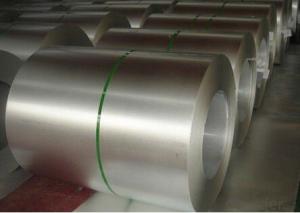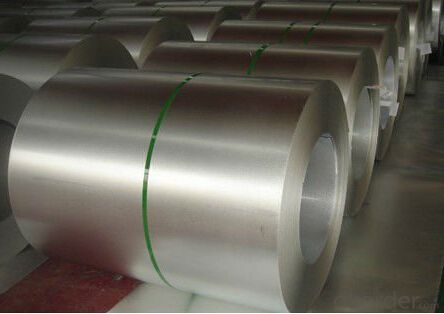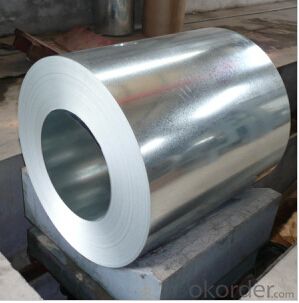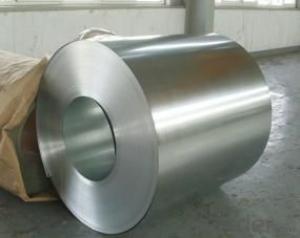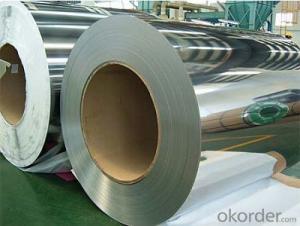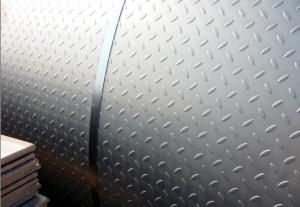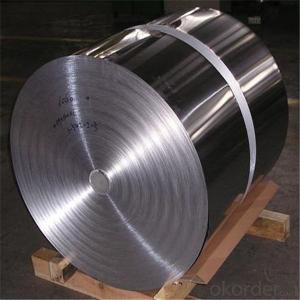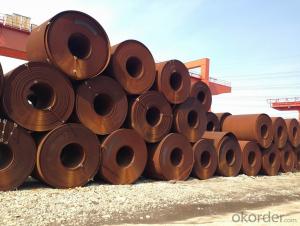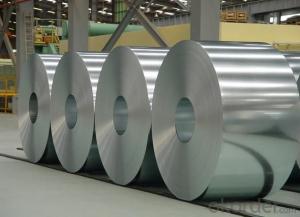Hot Rolled Black Annealed Coil for Construction
- Loading Port:
- Tianjin
- Payment Terms:
- TT OR LC
- Min Order Qty:
- 25 m.t.
- Supply Capability:
- 10000 m.t./month
OKorder Service Pledge
OKorder Financial Service
You Might Also Like
Basic Info.
Model NO.:Q195
Surface Treatment:Polished
Certification:SGS
Technique:Hot Rolled
Standard:ASTM, JIS, GB, AISI, BS
Application:Ship Plate
Edge:Slit edge
Steel Grade:Q195,Q235,Q345,Ss400,SPHC, A36, S235jr,S355jr,St37
Coil Weight:50-3000kg
Thickness:3-100mm
Export Markets:Global
Additional Info.
Trademark:XBY
Packing:Stanadrd Sea Worth
Standard:SGS
Product Description
Commodity: Hot rolled steel coil
Material: Q235, Q345, SS400, A36, S235JR, S355JR, S45C, S50C, A572
ST37, ST37-2, ST52 Q195 and etc.
Standard: ASTM A570, ASTM A36, JIS G3101, DIN EN 10025
GB/T09-2006
Surface treatment: polished and oiled
Tickness: 3-100mm
Width: 914-2500mm
Length: Coil
Coil ID: 580mm/610mm
Coil weight: <25MT
Applications: ship building, enginrering construction,mechanical , manufacturing,pavement slab, regular use
| Applications | Standard | |||||
| GB | JIS | DIN | ASTM | OTHERS | ||
| Hot Rolled Mild Steel | Q195 | SPHC,D,E | SAE1006-1008 | |||
| Rolled Steel for General Structures | Q235 | SS300 SS400 SS490 SS540 | ST37-2ST52-3 | A36 DIN USt34-2 | ||
| Rolled Steel for Welded Structures | Q345 | SM400 SM490 SM520 | S355JR | A570-40 A573-70 A633-E | ||
- Q: How does coil slitting work?
- Coil slitting is a process used to cut large coils of material, such as metal or plastic, into narrower strips. It involves feeding the coil through a set of rotating circular blades that make longitudinal cuts along the length of the coil. The blades are set at predetermined widths to achieve the desired strip thickness. The process is usually automated and ensures efficient and precise cutting, resulting in multiple narrower coils that can be used for various industrial applications.
- Q: How are steel coils used in the manufacturing of agricultural silos?
- Steel coils are used in the manufacturing of agricultural silos as they are rolled into large cylindrical shapes to form the outer structure of the silo. These coils provide strength, durability, and resistance to external elements, ensuring the silo can withstand the weight of the stored agricultural products and protect them from moisture and pests.
- Q: How are steel coils used in the automotive stamping industry?
- Steel coils are used in the automotive stamping industry to provide a continuous supply of flat steel sheets that are then fed into stamping machines. These coils are unrolled, straightened, and then fed through the stamping presses to create various automotive parts, such as body panels, chassis components, and other structural parts. The use of steel coils ensures efficiency, precision, and a consistent quality in the production of automotive parts.
- Q: How do steel coils contribute to the energy infrastructure sector?
- Steel coils play a vital role in the energy infrastructure sector by providing the necessary materials for the construction and maintenance of various energy-related structures and equipment. Firstly, steel coils are widely used in the production of pipelines, which are the lifelines of the energy industry. These pipelines transport oil, natural gas, and other energy resources over long distances, ensuring a steady supply to power plants and other energy facilities. Steel coils are used to manufacture seamless and welded pipes that possess high strength, durability, and resistance to corrosion, making them suitable for handling the harsh conditions of energy transportation. In addition to pipelines, steel coils are used in the production of storage tanks for oil, natural gas, and other fuels. These tanks are crucial for storing large quantities of energy resources, ensuring a continuous supply even during periods of high demand. Steel coils are utilized to fabricate the tank shells, providing the necessary strength and structural integrity to withstand the pressure and environmental factors associated with energy storage. Furthermore, steel coils are instrumental in the construction of power plants and other energy infrastructure facilities. They are used to manufacture structural components such as beams, columns, and supports, which provide the foundation and stability required for the safe operation of these facilities. Steel coils also contribute to the production of equipment such as turbines, generators, and transformers, which are essential for converting energy into usable forms and distributing it to end-users. Moreover, steel coils are utilized in the construction of transmission towers and electrical grids. These structures and networks are responsible for transmitting electricity from power plants to residential, commercial, and industrial consumers. Steel coils are used to manufacture the towers and poles that support high-voltage transmission lines, ensuring their stability and reliability in transmitting electricity over long distances. In summary, steel coils are indispensable in the energy infrastructure sector as they provide the necessary materials for the construction, maintenance, and operation of pipelines, storage tanks, power plants, transmission towers, and electrical grids. Their strength, durability, and resistance to corrosion make them an ideal choice for withstanding the demanding conditions of the energy industry, thereby ensuring a reliable and efficient energy supply to meet the growing needs of society.
- Q: I heard about a new bike the specialized allez steel. Has anyone heard anything about it. it will have all brand new components like shimano 2300 parts and everything. it looks nice.
- Steel? I doubt it's made out of steel, more labor and a heavier frame. Most likely aluminum. Shimano 2300 you say? The Shimano 2300 is the lowest of the low of Shimano road components. Most likely not too reliable and heavy. www.cyclestore .uk/productDetai... I think this is what you might be looking for.
- Q: What are the different types of steel alloys used in coils?
- Coils commonly employ various types of steel alloys, each possessing unique properties and characteristics. Some frequently used types include: 1. Carbon Steel: As the most fundamental and widely utilized steel alloy in coils, it boasts low carbon content and renowned strength and durability. Carbon steel coils find extensive application in areas demanding high strength, such as automotive parts, construction materials, and machinery components. 2. Stainless Steel: Comprising an iron, chromium, and other element alloy, stainless steel coils exhibit exceptional resistance to corrosion, formidable strength, and heat resistance properties. They are typically employed in scenarios where shielding against corrosion and staining is pivotal, such as kitchen appliances, medical equipment, and transportation components. 3. Galvanized Steel: Galvanized steel coils are formed by coating regular carbon steel with a layer of zinc, furnishing excellent corrosion resistance and safeguarding the underlying steel from rust. Commonly utilized in outdoor settings like roofing, fencing, and automotive body parts. 4. Alloy Steel: Alloy steel coils are manufactured by incorporating diverse alloying elements like manganese, nickel, chromium, or molybdenum into carbon steel, thereby enhancing the steel's strength, hardness, and wear resistance. These coils frequently find application in industries necessitating high strength and toughness, such as machinery, tools, and construction equipment manufacturing. 5. Electrical Steel: Electrically specialized steel coils are designed explicitly for employment in electrical equipment like transformers and electric motors. These coils possess low electrical resistance and high magnetic permeability, facilitating efficient electricity conduction and magnetic field generation. Typically constructed from a silicon alloy, which enhances electrical and magnetic properties. In conclusion, the selection of a steel alloy for coils hinges upon the specific requirements of the given application, encompassing factors like strength, corrosion resistance, electrical conductivity, and heat resistance.
- Q: doesnt steel rust?
- ferrous metals rust
- Q: How are steel coils used in the manufacturing of suspension springs?
- Steel coils are used in the manufacturing of suspension springs as they provide the necessary strength and resilience to support the weight of the vehicle and absorb shocks and vibrations. The steel coils are shaped and formed into the desired spring shape, which allows them to effectively compress and expand to absorb and distribute the impact and forces experienced during vehicle movement and road conditions.
- Q: How are steel coils inspected for surface defects?
- Steel coils are inspected for surface defects using various techniques such as visual inspection, automated systems, and magnetic particle inspection. Visual inspection involves trained personnel examining the coils for any visible defects or irregularities. Automated systems utilize cameras and sensors to detect defects and anomalies on the coil surfaces. Magnetic particle inspection, on the other hand, involves magnetizing the coil and applying magnetic particles to reveal any surface defects through the formation of visible indications. These methods ensure that steel coils meet quality standards before further processing or shipment.
- Q: What are the different types of steel coil edge conditions?
- The different types of steel coil edge conditions include mill edge, slit edge, and deburred edge.
Send your message to us
Hot Rolled Black Annealed Coil for Construction
- Loading Port:
- Tianjin
- Payment Terms:
- TT OR LC
- Min Order Qty:
- 25 m.t.
- Supply Capability:
- 10000 m.t./month
OKorder Service Pledge
OKorder Financial Service
Similar products
Hot products
Hot Searches
Related keywords
